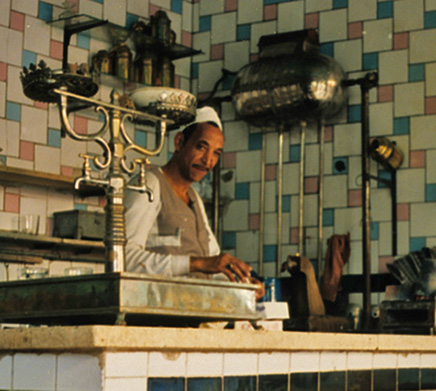
Egyptian drink seller near al-Azhar in 1983; photography by Daniel Martin Varisco
Egypt faces an ethical dilemma, one that affects anyone who has ever visited or carried out research in the country. My first experience in Egypt was in early 1981 when I conducted research in Asyut on rural sanitation for a USAID project, my first development assignment. This was still Sadat’s Egypt, open to American aid and seeking to end the bitter taste of unwinnable war with Israel. I felt safe no matter where I traveled. The only time I winced was when I visited the Pharaonic ruins in Luxor and stayed in one of the lesser hotels. Striking up a conversation with the young man at the hotel desk, he asked me if I could tell the nationality of another guest’s passport. The passport was in Hebrew and the guest was the Israeli consul. I calmly explained this to the clerk, who took it in stride – another paying customer. In 1983 I was able to spend a year in Cairo studying Islamic manuscripts at Dar al-Kutub, the Egyptian National Library. I could walk from my apartment in Zamalek on Ahmet Hishmet Street across the kubri to the library with my only fear being how to dodge the insane traffic crossing the corniche. I literally walked everywhere, enjoying the kebab, falafel and Groppi sweets. And everywhere I was welcomed with a hospitality and humor that anyone who has lived in Egypt can attest. This is the Egypt I have fond memories of, but this is now the Egypt that is exploding from within.
Egypt’s problems have always been forced upon the people by conquest after conquest from the Hyksos to the Greeks to the Arabs to the French to the British. The Arab Spring that seemed to bring the modern era of pseudo-Mamluk dictators to a close was heralded as a new beginning. The election, despite doubts of its validity, of Ibrahim Morsy as president with the obvious blessing at the time of the military was seen by many pundits as a hopeful sign. Would the Muslim Brotherhood, long in opposition but with a wide following, manage to meld their Islamic fervor with a stable and tolerant democracy? Whether this experiment might eventually have worked is now a moot point. The military coup that deposed Morsy last summer has now declared the Muslim Brotherhood a terrorist organization. There are certainly extreme elements under the umbrella of the Brotherhood, but the blast in Mansoura on Tuesday was probably the work of a more militant group based in the Sinai. So the violence is not about to abate. On Thursday a bus exploded in Nasr City. No doubt there will be more injuries and deaths today.
So who is to blame? The Muslim Brotherhood for the intolerance of some of its members against Copts and Muslims they disagree with? The military for its punitive action and disregard for human rights and existing legal mechanisms? The United States for its uncritical support of the Mubarak regime and reticence in calling a coup a coup? Perhaps money funneled into Egypt from wealthy Arab states? There is clearly blame to be shared by all parties. The ethical dilemma I face is that the zero-sum political games going on make it impossible to take a side. I have never been a fan of the Brotherhood, even recognizing the value of its social welfare. But then even Christian missionaries would give medical help for the bodies of people whose souls they wanted to save; yet I do not support the inherent ethnocentrism of missionary work. Neither do I applaud dictators who arrest and torture their assumed enemies, create a climate of fear and enforce their will with guns and tanks. If this was an old-fashoned John Wayne “Western,” no one would be wearing a white hat.
Egypt, like everywhere else, needs brotherhood, genuine brotherhood of the Greek philadelphia variety. It does not need a unilateral “Muslim” brotherhood any more than it would a Christian or Jewish brotherhood. Muslims should indeed treat each others as brothers, a trait practiced by the prophet Muhammad, but even this has not been a hallmark of the Muslim Brotherhood’s history. Muslims dominate the population of some 81 million people in Egypt, but this historical land is also home to Christian Copts, a small number of Jews and individuals who see themselves as secular, even atheists. I do not believe that the majority of Egyptians want to go back to the days of the Fatimids or Ayyubids or Mamluks, certainly not if they know their history about the corruption, bloodshed and irreligious behavior of rulers in those times. Perpetuating brotherly hate will only make Egypt a pariah state, destroying the economy that depends on tourism and going against the grain of the modern history of nation states. Brotherly love would go a long way to mitigating the current violence, but even a dose of brotherly tolerance would help.